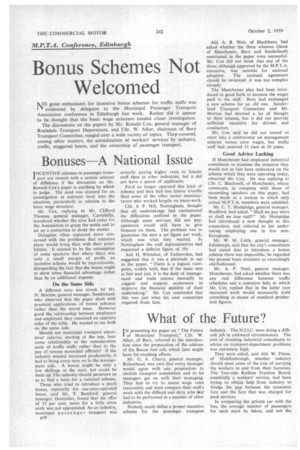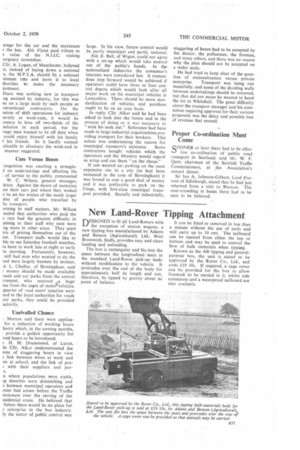Bonuses —A National Issue
Page 64

Page 65

If you've noticed an error in this article please click here to report it so we can fix it.
I NCENTIVE schemes in passenger trans port are viewed with a certain amount of diffidence if the discussion on Mr. Ronald Cox's paper is anything by which to judge. The need was stressed for an investigation at national level into the situation, particularly in relation to the basic wage structure.
Mr. Cox, replying to Mr. Clifford Thomas, general manager, Caerphilly, wondered whether the time had come for the Association to grasp the nettle and to set up a committee to study the matter.
Delegates often appeared more concerned with the problems that incentive plans would bring than with their possibilities. It seemed to be the assumptiqn of some speakers that where there was only a small margin of profit, an incentive scheme would be impracticable, disregarding the fact that the bonus ought to show some financial advantage rather than be an additional expense.
On the Same Side
A different note was struck by Mr. N. Morton, general manager, Sunderland, who observed that the paper dealt with practical applications of bonus schemes rather than the moral issue. However good the relationship between employers and employed, they remained on opposite sides of the table. He wanted to see both on the same side.
Should not municipal transport executives' salaries, starting at the top, bear some relationship to the remuneration scale of traffic staffs rather than to the pay of remote municipal officials? If the industry wanted increased productivity it had to bring every man on to the management side. A bonus might be only a few shillings at the start, but could be built up. The industry should persevere so as to find a basis for a national scheme.
Those who tried to introduce a merit bonus, especially for one-man-operated buses, said Mr. T. Bamford, general manager, Doncaster, found that the offer of 15 per cent, more for a little extra work was not appreciated. As an industry, municipal passenger transport was a30 actually paying higher rates to female staff than in other industries, but it did not have a queue of applicants.
Ford no longer operated this kind of scheme and they had less labour trouble than some of the other motor manufacturers who worked largely on piece-work.
Car. S. P. Hill, Nottingham, thought that all undertakings had encountered the difficulties outlined in the paper. Although some services did not pay, operators would still have to give bonuses on them. The problem was to guarantee the men a set figure per week, which was what they wanted. In Nottingham the staff representatives had requested a definite figure of 10s.
Aid. H. Whitaker, of Todmorden, had suggested that it was a platitude to say in the paper, " There is a logical viewpoint, widely held, that if the basic rate is fair and just, it is the duty of management and trade unions mutually to suggest and support economies to improve the financial stability of their undertaking." Mr. Cox contended that this was just what his own committee required from him.
Ald. A. R. Weir, of Blackburn, had asked whether the three schemes (those of Manchester, Bury and Sunderland) mentioned in the paper were successful. Mr. Cox did not think that any of the three, although approved by the M.P.T.A. executive, was suitable for national adoption. The national agreement should be reviewed: it was too complex already.
The Manchester plan had been introduced in good faith to increase the wages paid to the staff. Bury had exchanged a new scheme for an old one. Sunderland Transport Committee and Mr. Morton had devoted a lot of thought to their scheme, but it did not provide sufficient incentive for drivers and conductors.
Mr. Cox said he did not intend to enter into a controversy on management salaries versus crew wages, but traffic staff had received 11 rises in 10 years.
Good Advice Lacking If Manchester had employed industrial consultants to examine the situation they would not in fact have embarked on the scheme which they were operating today. observed Mr. Cox. He was replying to air. C. Blackwell, of Manchester, whose comments, in company with those of succeeding speakers on this paper, had been made at a session to which only actual M.P.T.A. members were admitted.
Mr. C. T. Humpidge, general manager, Bradford, had asked, "Shall we pay more or shall we lose staff?" Mr. Humpidge had introduced a new thought in this connection, and referred to his undertaking employing one in five nonEuropeans.
Mr. W. M. Little, general manager, Edinburgh. said that his city's consultants had stated that to introduce a bonus scheme there was impossible; he regarded the present basic structure as exceedingly old-fashioned.
Mr. A. F. Neal, general manager, Manchester, had asked whether there was any real difference between traffic schedules and a conveyor belt, to which Mr. Cox replied that in the latter case increased work would necessarily yield something in excess of standard production figures. erage for the car and the maximum r the bus. Aid. Flynn paid tribute to !, value of the N.J.I.C. visiting iergency committee.
alr. A. Logan, of Manchester, believed it, instead of laying down a national :e, the M.P.T.A. should fix a national nimum rate and leave ' it to local thorities to make the necessary iustment.
There was nothing new in transport .ng assisted by industry, for this was ae on a large scale by such people as tstructional contractors. On the :stion of shift operations for industry terally at week-ends, it would be :essary to hive off two-thirds of the ,illation in each period, but the rage man wanted to be off duty when could enjoy himself with his family I his friends. So it hardly seemed cticable to eliminate the week-end in manner suggested.
Cars Versus Buses
l'ongestion was exerting a strangle1 on undertakings and affecting the of service to the public, commented W. C. Wilson, general manager, :kton. Against the desire of motorists nit their cars just where they wished .t be set the wishes of the much larger iber of people who travelled by lic transport. urning to staff matters, Mr. Wilson ended that authorities who paid the c rate had the greatest difficulty in aining to their staff why men were ng more in other areas. They must are of pricing themselves out of the ket. Transport staffs would like to ble to see Saturday football matches, to have to work late at night or early he morning. Fortunately, however, still had men who wanted to do the Ind were largely busmen by instinct. d. L. Chaffey, of Birmingham, said money should be made available oads and car parks from the central :rnment, who received ,a huge iue from the uses of motoNehicles. quarter of road users' taxation were ned to the local authorities for roads car parks, they could be provided actorily.
Unrivalled Chance
Morton said there were applicafor a reduction of working hours lustry which, in the coming months, : provide a golden opportunity for :red hours to be introduced.
r. H. M.Drummond, of Luton, ht dr. Alker underestimated the ems of staggering hours in view
link between wives at work and en at school, and the link of pro with their suppliers and pur n where populations were stable, ig densities were diminishing and s between municipal operators and inks had arisen before the Trafficiissioners over the serving of the esidential areas. He believed that future there would be no place for enterprise in the bus industry. ly the sector of public control was large. In his view, future control would be partly municipal and partly national.
Aid. E. Ball, of Wigan, could not agree with a set-up which would take control out of the public's hands. In the nationalized industries the consumer's interests were considered last. A tremendous step forward would be achieved if operators could have three or four central depots which would look after all major work on the municipal vehicles in Lancashire. There should be more standardization of vehicles and purchase ought to be on an area basis.
In reply, Cllr. Alker said he had been asked to look into the future and in the process of doing so it was necessary to " stick his neck out." Reference had been made to large industrial organizationsyroviding transport for their workers. This action was undermining the reason for municipal transport's existence. Some contractors bought vehicles which the operators and the Ministry would regard as scrap and ran them "on the cheap."
If one wanted car parking on the most expensive site in a city (as had been instanced in the case of Birmingham) it was bound to cost a good deal of money and it was preferable to park on the fringe, with first-class municipal transport provided. Socially and industrially, staggering of hours had to be accepted by the doctor, the policeman, the fireman, and many others, and there was no reason why the plan should not be accepted on a wider scale.
He had tried to keep clear of the question of nationalization versus private
enterprise. Transport was being run wastefully, and some of the dividing walls between undertakings should be removed, but that did not mean he wanted to hand the lot to Whitehall. The great difficulty about the transport manager and his committee requiring approval for their various proposals was the delay and possible loss of revenue that ensued.
Proper Co-ordination Must Come
SOONER or later there had to be effective co-ordination of public road transport in Scotland, said Mr. W. F. Quin, chairman of the Scottish Traffic Commissioners, at the Association's annual dinner.
Sir Ian A. Johnson-Gilbert, Lord Provost of Edinburgh, stated that he had just returned from a visit to Warsaw. The over-crowding in buses there had to be seen to be believed.












































































































































































































































